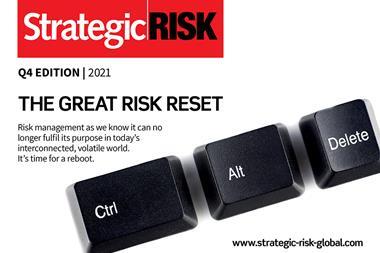StrategicRISK talks to Sean McGovern, CEO, UK & Lloyd’s market at AXA XL as Airmic launches its new ‘Roads to’ report
What have been some of the main lessons learned from the COVID crisis in terms of the need to repurpose business models and be nimble in the face of a major global threat?
First and foremost, the COVID-19 pandemic has been a human catastrophe and, despite the fact that pandemic has been high on companies’ and governments’ risks registers for some time, COVID-19 was a calamity on a scale that we had not expected. It has underlined to businesses across all sectors the importance of planning for, and being able to react quickly to, major threats. Pandemic ranks highly in the 2021 AXA Future Risks Report, both from the perspective of risk experts and the general public.
The COVID-19 crisis showed us that many companies were able to be very nimble and repurpose very quickly – and many will likely never revert to their previous business models. In some sectors, however, repurposing was more challenging or even impossible to do, and for these companies the importance of long-term planning and strategic business continuity and risk management has been underscored by the pandemic and its effects.
The COVID-19 pandemic has shown us all that we must be not lose focus on ’Grey Rhino Risks’ – risks that are highly probable, high impact and yet somewhat neglected. COVID-19 has shown us that these events do happen and that we must be prepared for other major risks like climate change and cyber threats.
The personal impact of the pandemic has caused companies to rightly focus on their employees’ mental health and wellbeing, ensuring colleagues are properly supported. It has also prompted companies to reflect on their purpose and the commitments they’re making to their colleagues, their clients and their communities. This sense of corporate purpose and identity has risen even further in the minds of employees as they consider not just how they want to work in the future but which organisations they want to work for. So commitments on environmental, social and governance issues become very important factors in attracting and retaining talent and building culture.
Overall, I’d say one of the major lessons learned from the pandemic is that companies are able to react quickly in the event of a major threat and should take confidence that, with the right business continuity planning and strategic risk management, they will be able so to do again. And it has given us an opportunity to think about the kind of society we want to live in and the kind of companies we want to be.
As we begin to emerge from the pandemic and organisations consider their ESG responsibilities, is it logical that business models will continually need to adapt?
Yes, it is both logical and necessary. The pandemic has prompted many people to think about their priorities, and many expect more from their employers and from the companies they transact with. Issues around sustainability, for example, are top of colleagues’ minds and will remain at the top of their agenda. If companies do not respond to this sea change then colleagues and customers will move elsewhere.
The pandemic has reinforced how interconnected the world is and highlighted to people a sense of global accountability. It has shown how social risks in one area can become global risks.
Ensuring healthy societies and a thriving planet is vital for the future success of economies and the businesses that operate within them. That is one reason why the AXA Group is vocal on the topic of biodiversity, for example. Biodiversity loss – which is exacerbated by climate change – endangers ecosystems and threatens the societies and businesses that depend on them. In 2018, AXA committed to acting on biodiversity loss, as a natural extension to our climate efforts and the next step in a move towards sustainable finance. Among several initiatives, AXA has joined the Business for Nature Pledge and is also part of the international working group dedicated to creating nature-related financial disclosures.
It is also hugely important that societies transition out of the pandemic in an inclusive and fair way, and that recovery is equitable. Businesses will come under a harsh spotlight if they are not seen to be managing the recovery in a fair and inclusive way.
Work like the Airmic ‘Roads to Repurposing’ report is hugely important in helping businesses to understand the importance of managing this transition in a way that is responsible and fair. As companies continue to adapt and repurpose post-pandemic, ESG will be top of minds not just for the C-Suite but for colleagues all the way through organisations.
What does all this mean for a risk and opportunity perspective, and how should corporate risk managers be addressing issues such as ESG and sustainability risk?
People in the street are having these conversations and so the risk community has to be talking about – and acting on – these risks and opportunities. The greater emphasis on corporate responsibility, sustainability and ESG topics has to run from the top to the bottom of our organisations – and back up again – this is an issue for all of us.
Risks like those posed by climate change are on everyone’s agenda and everyone in an organisation needs to feel they have a part to play. There is huge opportunity for societies and businesses to work towards targets such as net zero but this requires major socio-economic change.
Risk managers can facilitate communication within their businesses about these risks and opportunities and help to underscore the vital role that we all have to play and to embed good ESG practices throughout their organisation.
Inaction is not an option, but it also important to remember that with change comes opportunity – risk managers can help their organisations to find the opportunity in this change.
Risk managers are ideally placed to facilitate communication and dialogue on these issues, both with different stakeholders within their organisations but with wider business, governmental departments and other groups too.
One major way in which risk managers’ interactions with both the insurance market and their companies’ C-Suites is changing because of these issues is the move from the risk management role being mainly a transactional one to being much more of a strategic one. Our partnerships with our risk manager clients are becoming focused on the longer term – this is no longer just a question of procuring insurance capacity. These issues are now top of the risk management agenda – as the Airmic conference programme and reports like ‘Roads to Repurposing’ show.
Tackling climate change, for example, is a long-term challenge and to begin to move the dial on this issue the risk management community is taking a more long-term view. Insurance carriers can help here too by analysing data, for example, and providing our clients with longer term solutions in which good ESG practices are recognised and rewarded.
London is recognised around the world for its insurance and risk expertise and is renowned for its experience in addressing the most complex, emerging risks. It has a dual role to play; both by supporting our clients and local communities in tackling the immediate impacts of climate change and – through the work being done within the London market and Lloyd’s – by helping to create climate resiliency around the world. This is an opportunity that we cannot afford to miss.
Central to this is tackling the protection gap – the gap between economic and insured losses – and insuring the green transition as we move to a decarbonised world.
How can AXA XL support organisations as they undergo major changes in business models and ways of working?
That is what we are here for. When risks arise we are here to help companies to devise solutions to manage and mitigate risk. But our role goes much further than that. We can facilitate tri-partite communications between risk managers, brokers and underwriters to understand how risks are changing as business models and ways of working alter.
We are taking the high-level research that we undertake in studies such as the AXA Future Risks Report and the AXA Research Fund into our discussions with clients and translating that on a much more granular level to help clients understand how these risks will affect their business and their supply chains and so on.
Our expertise in risk engineering, for example, gives us hugely valuable data that we can use to understand the effect of changes on a business’ risk profile and to adapt appropriate risk transfer solutions.
As well as working to create risk transfer mechanisms for more sustainable business models – such as renewable energy – we are able to co-create solutions with clients and to develop tools to help identify and manage water-related risks, for example.
This is about more than providing capacity. We want to partner our clients to jointly find solutions to these important issues.
It is also important that we act on these issues ourselves and demonstrate that we are responsible, long term partners for clients.
We are committed to decarbonising our own business, for example, and want to work with our clients to help them do the same. And AXA is one of the international insurance and reinsurance groups setting up the Net Zero Insurance Alliance which is aimed at ensuring our industry plays its part in the transitions to a net-zero emissions economy.
In 2020, AXA was ranked number two in the insurance industry on the Dow Jones Sustainability Index (DJSI), with a score of 88/100, an increase of 5 points compared with 2019.
As I mentioned earlier, these are issues that affect each and every one of us – and we all have a role to play in addressing them.
Blog: Airmic Conference 2021 Daily News Summary
- 1
- 2
- 3
- 4
- 5
- 6
- 7
- 8
- 9
- 10
- 11
- 12
- 13
- 14
- 15
- 16
 Currently reading
Currently readingAirmic interview: Repurposing in action
- 17




































No comments yet